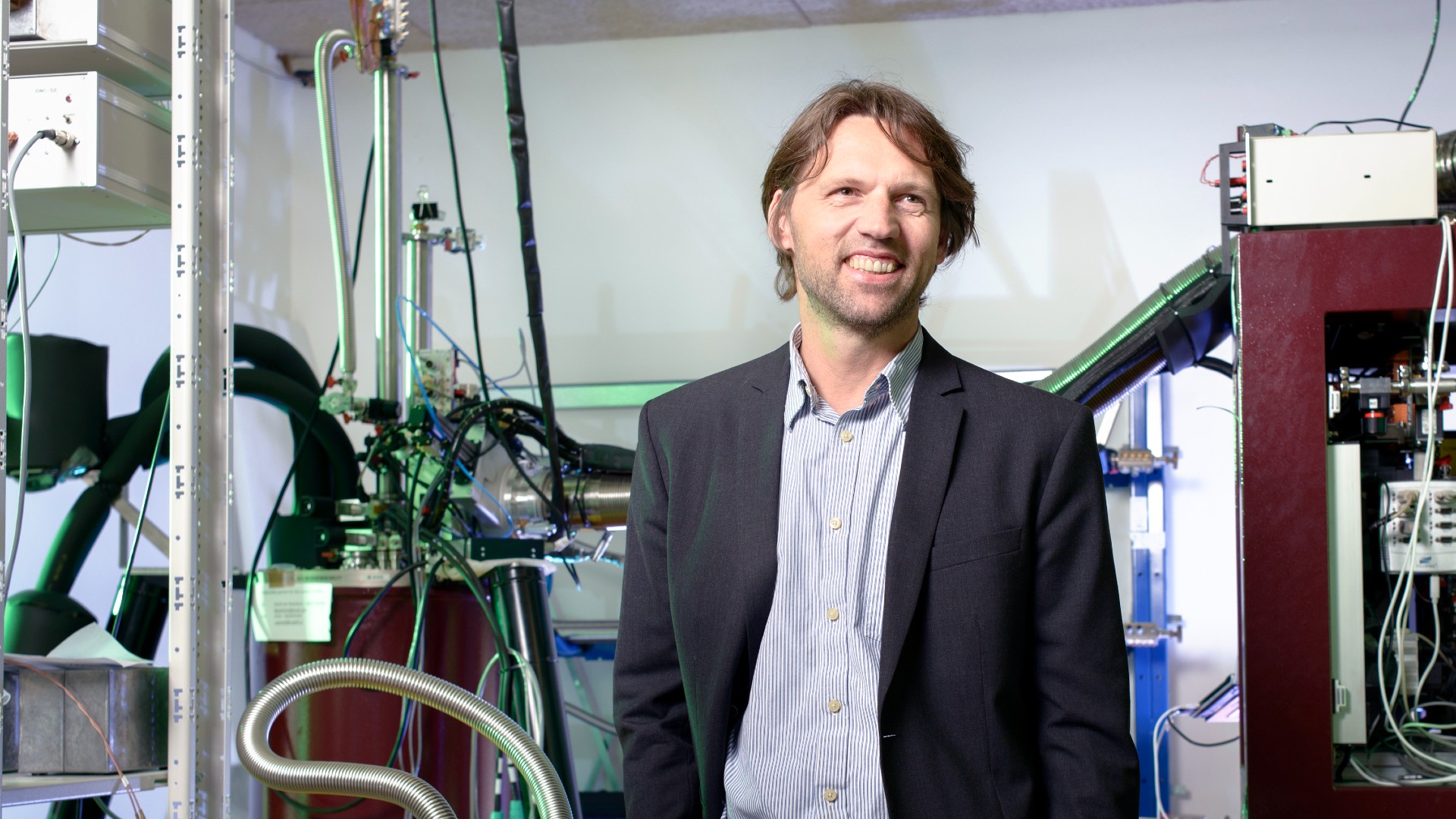After a rollercoaster ride of royal success to an investigation into scientific integrity, Leo Kouwenhoven will return as a University Professor on 1 March 2024.
Kouwenhoven: “Fortunately, PhD students and postdocs have not been idle in recent years.” (Photo: Klapstuk for QuTech)
The highlight of his fame was, no doubt, the opening of the Microsoft Quantum Lab on 21 February 2019. It was an occasion where Kouwenhoven and King Willem Alexander shook hands vigorously. The auditorium was packed and virtually the entire national press reported on the promising research into the quantum computer that was to take place in Delft.
Kouwenhoven (born 1963) had transferred from TU Delft’s Faculty of Applied Sciences to Microsoft in late 2016 to head the company’s Quantum Lab. He retained an unpaid contract at TU Delft.
“I promise you that we will make amazing discoveries here,” Kouwenhoven said at the opening of the Microsoft Quantum Lab. The Director of Microsoft in the Netherlands, Ernst-Jan Stigter, added to his prediction that Delft was going to be the quantum capital of the world.
Crisis
The first problems appeared a year later when the researchers themselves failed, in repeated attempts, to replicate previously published results of the Majorana research. Majoranas are the quasi-particles discovered by Kouwenhoven in 2012 that experts predicted could be suitable as quantum bits or qubits – the building block of the promising quantum computer – because of their imperturbability.
Kouwenhoven and his team wrote to Nature on 29 April 2020 to express their doubts. Nature immediately added an addendum to the article to inform readers of the doubts. TU Delft’s Scientific Integrity Committee (SIC) launched an investigation in 2020 at the behest of the Executive Board.
QuTech, the quantum lab of TU Delft and TNO, announced on 16 May 2020 that incorrect data processing had taken place. Less than a year later, on 8 March 2021, the official retraction of the 2018 article that dealt with the Majorana measurements (Quantized Majorana Conductance) followed.
In March 2022, Kouwenhoven left Microsoft.
‘Blind to the data not fitting the purpose they were pursuing’
Shortly thereafter, on 19 April 2022, a second retraction followed that concerned an earlier 2017 article that dealt with the materials used.
A few months later, on 8 June 2022, the Integrity Committee of the National Organization for Scientific Integrity (LOWI in Dutch) ruled that Kouwenhoven and his postdoctoral researcher, Hao Zhang, had been negligent in their 2018 Majorana article.
In the conclusion of their report (8 March 2021) the SIC had previously written that ‘the authors were so carried away by their enthusiasm that they were blind to the data not fitting the purpose they were pursuing.’
Absolution
In a press release, QuTech now cites a new CWI report that would absolve Kouwenhoven of suspicion of errors in the 2017 article. (Delta has requested the report from the CWI but has not yet been able to see it.) This would clear Kouwenhoven’s reputation, opening the way for an appointment as a University Professor at Delft University of Technology by 1 March 2024.
A ‘University Professor’ is a special position at Dutch universities. Compared to ordinary professors, a university professors usually get a lot of freedom, extra money for research, and often exemption from board work or teaching obligations.
Return
‘I am happy to return to TU Delft’, Kouwenhoven responded in the press release. ‘The last few years have been tough, but I am happy to have accounted for the research I have led all these years. Both the LOWI and the Executive Board have concluded that there has been no violation of scientific integrity. Regarding the Quantized Majorana Conductance publication, it was concluded that I should have been more careful as a supervisor, and I fully agree. Now that the integrity investigation is complete, scientific debate can resume.’
In recent years, Kouwenhoven supervised PhD students behind the scenes as an ‘independent researcher’. For example, he co-authored a new Majorana publication published earlier this year in Nature by the research team of Guanzhong Wang, Nick van Loo and Tom Dvir. The publication was the first sign that TU Delft Majorana research is getting back on its feet.
“Fortunately, PhD students and postdocs have not been idle in recent years,” Kouwenhoven said. “They have successfully developed an alternative approach to achieve Majorana states. This new approach is promising, initially for fundamental quantum research and possibly later as the basis for a new qubit.”
Do you have a question or comment about this article?
j.w.wassink@tudelft.nl


Comments are closed.